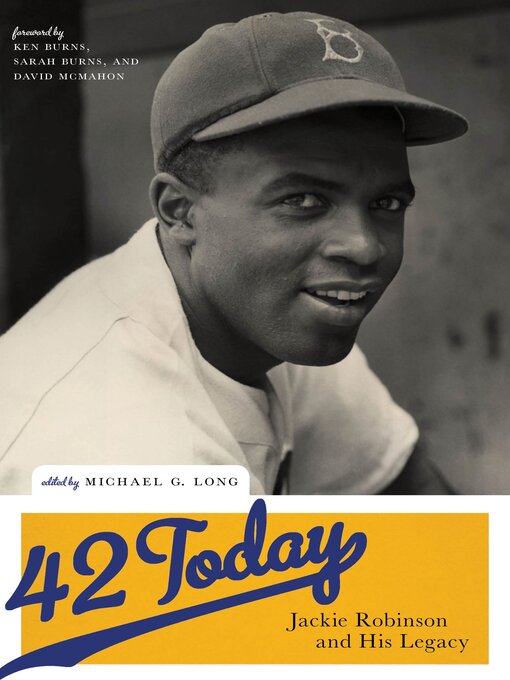Explores Jackie Robinson's compelling and complicated legacy
Before the United States Supreme Court ruled against segregation in public schools, and before Rosa Parks refused to surrender her bus seat in Montgomery, Alabama, Jackie Robinson walked onto the diamond on April 15, 1947, as first baseman for the Brooklyn Dodgers, making history as the first African American to integrate Major League Baseball in the twentieth century. Today a national icon, Robinson was a complicated man who navigated an even more complicated world that both celebrated and despised him.
Many are familiar with Robinson as a baseball hero. Few, however, know of the inner turmoil that came with his historic status. Featuring piercing essays from a range of distinguished sportswriters, cultural critics, and scholars, this book explores Robinson's perspectives and legacies on civil rights, sports, faith, youth, and nonviolence, while providing rare glimpses into the struggles and strength of one of the nation's most athletically gifted and politically significant citizens. Featuring a foreword by celebrated directors and producers Ken Burns, Sarah Burns, and David McMahon, this volume recasts Jackie Robinson's legacy and establishes how he set a precedent for future civil rights activism, from Black Lives Matter to Colin Kaepernick.
-
Creators
-
Series
-
Publisher
-
Release date
February 9, 2021 -
Formats
-
Kindle Book
-
OverDrive Read
- ISBN: 9781479805631
-
EPUB ebook
- ISBN: 9781479805631
- File size: 1382 KB
-
-
Languages
- English
-
Reviews
-
Publisher's Weekly
November 9, 2020
Biographer Long (Jackie Robinson: A Spiritual Biography), along with 13 contributors, explore lesser-known aspects of the life of Jackie Robinson, who became the first Black American to play Major League Baseball when he joined the Brooklyn Dodgers in 1947. Robinson’s Methodist faith is explored in Randal Maurice Jelk’s “A Methodist Life,” which examines how Robinson’s wife Rachel’s connection with the AME Church—and its message of “self-determination, self-sufficiency, and black independence”—influenced Robinson. The “First Famous Jock for Justice” catalogs the athletes who followed Robinson’s efforts on behalf of racial equality with their own social justice activism. Other notable essays include “Before the World Failed Him,” which discusses Robinson in context with other civil rights leaders, and “On Retirement,” about his life after hanging up his glove. Even those who know nothing about Robinson will take something inpsiring away from this excellent anthology. -
Kirkus
Starred review from December 15, 2020
A collection of essays on the baseball great's impact on American society. Editor Long and his contributors attempt to separate the man from the myth and show how his influence continues to extend. Who was Jackie Robinson (1919-1972)? He ended racial segregation in Major League Baseball when he signed with the Brooklyn Dodgers in 1947. He succeeded in part because he refused to respond to taunts or even acknowledge hateful slurs, but he showed an aggression on the field that may have been fueled by anger. After his retirement, he became a civil rights spokesman, defender of the Vietnam War, and a man at odds with more militant figures such as Malcolm X and Muhammed Ali. All of these facts fail to capture the complexity of the man and the heroism of his achievement. These pieces embody all of what made Robinson special, assessing him through many different lenses: the Methodist faith that he shared with Branch Rickey, who signed him to the Dodgers and exploited him for financial gain while denying that he (and baseball) had felt any political pressure to integrate; the Black and communist press that pushed for integration while the mainstream press either ignored the issue or resisted integration (in their own ranks as well as in baseball); the strong female presence--mother, wife, daughter--that helped shape Robinson's values and influenced his support for Black female athletes; and the political climate of the era, which bears a resemblance to that of today. Robinson was a seminal warrior in a movement before there was a movement. As Martin Luther King Jr. proclaimed, "He was a sit-inner before sit-ins, a freedom rider before freedom rides." Contributors include Howard Bryant, Mark Kurlansky, Jonathan Eig, Sridhar Pappu, Amira Rose Davis, and Kevin Merida, who provides the afterword, noting how Robinson "would invariably be disappointed in how white the entire decision-making infrastructure of sports remains." A successful attempt to give a towering cultural figure his due beyond the baselines.COPYRIGHT(2020) Kirkus Reviews, ALL RIGHTS RESERVED.
-
Formats
- Kindle Book
- OverDrive Read
- EPUB ebook
Languages
- English
Loading
Why is availability limited?
×Availability can change throughout the month based on the library's budget. You can still place a hold on the title, and your hold will be automatically filled as soon as the title is available again.
The Kindle Book format for this title is not supported on:
×Read-along ebook
×The OverDrive Read format of this ebook has professional narration that plays while you read in your browser. Learn more here.


